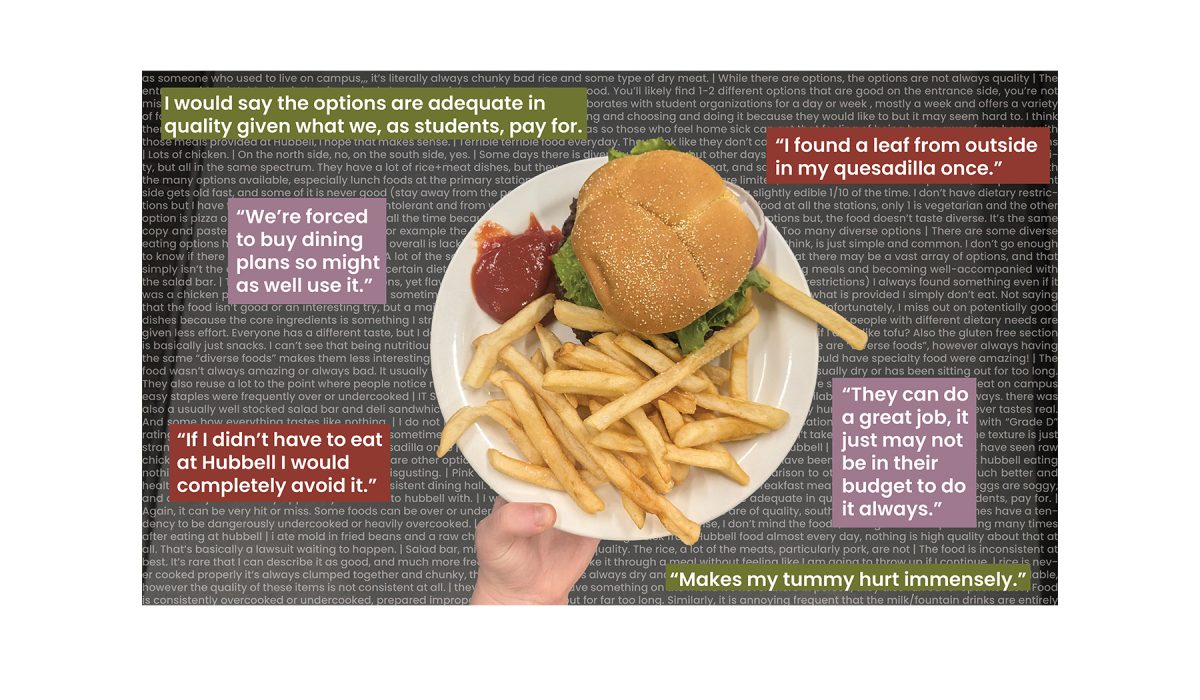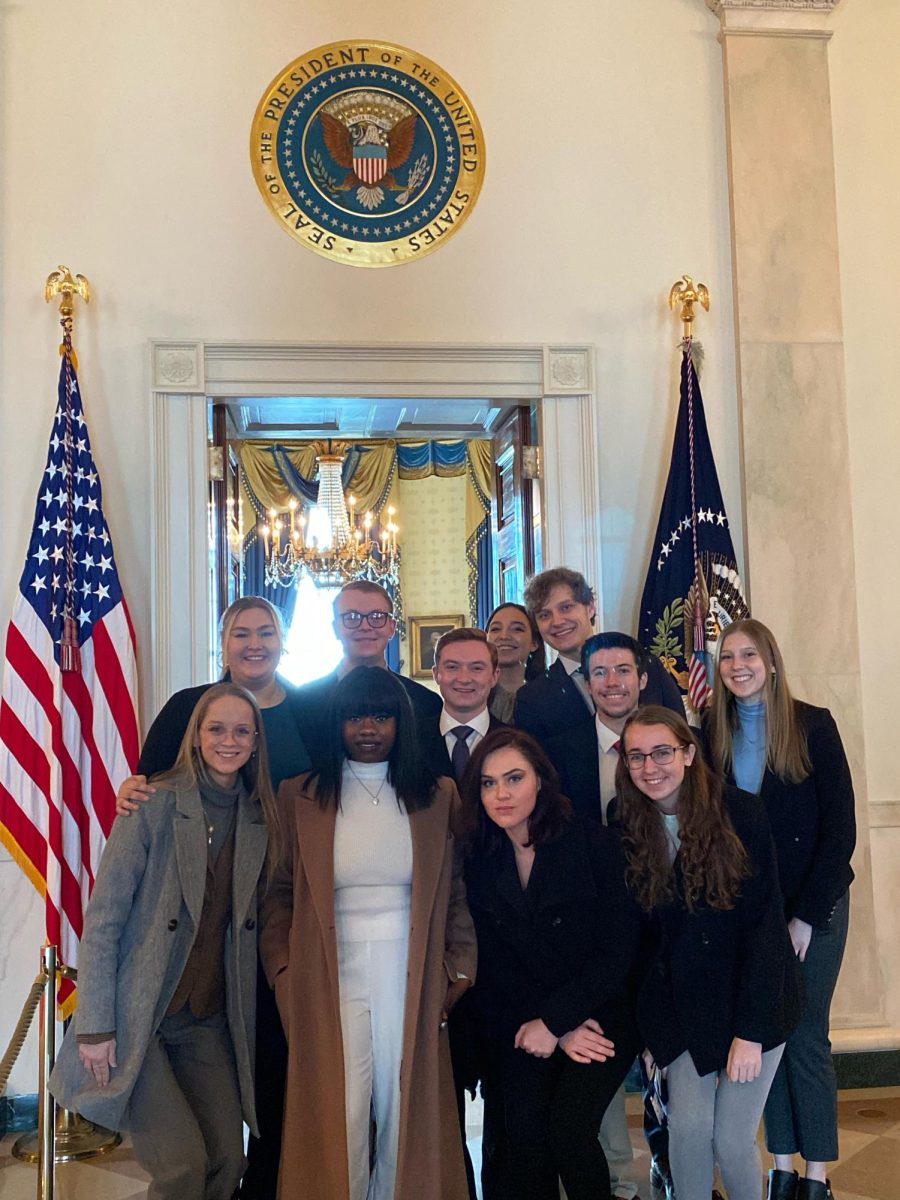ONLINE EXCLUSIVE STORY BY JOHN WINGERT
I distinctly remember watching Trump’s presidential announcement speech.
Although I had missed some of the juicier lines at the beginning, I still arrived in time to see the real estate mogul-turned-politician wandering through hyperboles and insults to the cheering applause of paid actors. Lines like “greatest jobs president that God ever created” were seared into my meninges, much to my horror and guilty amusement.
However, the real story of Donald Trump is not just his persisting series of outrageous comments that he bandies about, but also the media attention it garners.
Many have already noted that the media has amplified Trump’s popularity through unending news coverage of his more and more unforgivable rhetoric, but few have pointed to the real heart of the matter.
Yes, Trump understands the media. Yes, Trump has been able to play the media. Yes, Trump’s comments are newsworthy and certainly attract views and clicks. However, the real story is the endemic levels of underestimation the media has used when talking about Donald Trump.
Immediately after Trump waved his last wave to the carefully curated crowd at Trump Tower in New York City, CNN commentators were already chortling to themselves and discussing between pundits whether the announcement was worth covering.
Before every statement, they seemed to say, “he’s a joke, but what about such and such policy idea?” or “obviously Trump won’t implement any of this, but what about X, Y, or Z rhetoric?”
This trend has been omnipresent. Due to Trump’s repeated flirtations with a presidential run, no one took this one seriously. Just over a year ago, reporters called Trump’s speeches and trips a “fake campaign trail.” Pundits repeatedly referred to him as a “joke candidate.” No one expected much of the Donald.
His presidential announcement, while amusing to many politicos, was almost immediately scorned across all media. It was derogated and derided with too many polemics to count. Trump’s statements, with certainty, that Mexicans were “bringing drugs. They’re bringing crime. They’re rapists,” but then wavering with hesitation to say, “and some, I assume, are good people,” was the perfect target at which journalists could aim.
Then he skyrocketed in the polls.
This, of course, came as a tremendous shock to everyone. All possible commentators had weighed in on the practical joke that was Trump’s campaign. Everyone underestimated the demagogic potential of Trump’s message and the demand for disestablishmentarianism.
On the other hand, how could they not have miscalculated? After all, he did everything wrong.
Instead of hiding or evading his wealth, Trump emphasized it to fantastic extremes. In his presidential announcement, he proudly included that he was worth $8.7 billion. In recent weeks, he has even said that his net worth has grown to closer to $10 billion despite repeated setbacks and partnership terminations from groups like NBC, Univision, and Macy’s. Forbes and others have consistently valued his assets at far less (more like $4 billion), but Trump has made a point of emphasizing that he is richer than everyone says and more fabulously affluent than the media could imagine. Above all, Trump places special emphasis on the value of his brand, something he claims is dishearteningly undervalued.
Trump has also done little to advance the key Republican interest of pursuing new and growing demographics throughout the United States. His comments about Mexicans, which he has steadfastly stood behind, have caused an uproar among Hispanic communities as his opprobrium has intensified and metastasized.
Let us also not forget that Donald Trump has been one of the chief proponents of the birther movement.
Long after its initial advocates silenced their criticisms of President Obama’s birthplace, Trump said in July to Anderson Cooper of CNN that he is still not sure whether President Obama was born in the United States.
However, for Trump’s target demographics, these were nothing compared to comments about John McCain and prisoners of war.
After saying that he’s never asked God for forgiveness, another cardinal sin, the concentrated vitriol that Trump spewed in the Family Leadership Summit in Ames, Iowa about POWs demonstrated a complete inability to self-censor. Saying “I like people that weren’t captured,” Trump effectively disparaged soldiers who became POWs as one of his featured strawmen, “losers,” who are weighing down American potential.
Nearly every Republican candidate, notably excluding Ted Cruz and Ben Carson, harangued Trump for his acerbic comments toward U.S. veterans. The “establishment” could hardly have disapproved more of his thoughtless hate. The media quickly hailed this gaffe as the end of Trump’s ascension.
And yet . . . the Family Leadership Summit that saw Trump’s caustic comments about American POWs churn and explode to the agog distress of observers everywhere was on July 18. Since then, Trump’s polls have only reached even more empyrean heights.
A Rasmussen poll taken from July 26-27 saw Trump’s largest comparative advantage to that point with him leading 12 points ahead with 26%, more than a quarter, of Republican votes.
Then came his debate performance in August. Among many missteps, Trump stood behind fairly misogynistic diatribes, failed to offer a coherent plan or policy proposal, and — worst of all, threatened to run as a third party, spoiler candidate.
After the debate, matters only got worse. Many experts and pundits thought Trump lost the debate. Focus groups decried his performance. Although he held the limelight, he had nothing substantive to offer. Following his predator instinct, Trump went on the offensive by blasting the moderators and Fox News, but especially Megyn Kelly.
Trump attacked her viciously. He seemed to insinuate (although he has called adopters of this interpretation “deviants”) that Megyn Kelly asked him tough questions, because she was menstruating.
However, despite these obscenities and volleys against a conservative bastion like Fox News, Trump stands stronger and taller than the walls of Troy.
A recent YouGov poll found that 28% of Republicans had Trump as their first choice with 38% of Republicans having Trump as either their first or second choice. In the most recent head-to-head polls, Trump is beating fellow potential candidates Hillary Clinton, Joe Biden and Bernie Sanders. The most recent CNN/ORC poll aggregated by Real Clear Politics has him with his highest figures yet, polling at 32% among likely Republican primary voters.
The unending underestimation has proved to have no predictive power. Trump’s unique ability of contradistinction by emphasizing his own abilities through sharp contrast with other candidates has launched him stratospherically. Sparring with other candidates like Rick Perry or Lindsey Graham has continually left him unscathed. Although his tactics for a general election seem sclerotic, his current hegemony should be unquestionable.
Nonetheless, headlines that continually say things like “Look Who Will Win Trump’s Votes When He Flames Out” or “What Trump Bump?” assiduously assert that he is the joke candidate everyone thought. Although he makes for great political theater and satire, he may be a new normal.
I deeply doubt that he will be the eventual nominee, but underestimation has done nothing but exacerbate media attention at his shocking poll numbers. Foreseeing his demise will not necessarily make it happen. Although there may be a horizon beyond which he will no longer feature, we should be wary at insisting that we can see that horizon already.







Patricia Day • Sep 17, 2015 at 6:34 pm
Excellent, I totally agree!
Timothy Wingert • Sep 17, 2015 at 4:05 pm
Very well written.